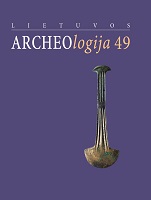HISTORY WILL SAY THEY WERE FRIENDS: REFLECTIONS ON aDNA AND GENDER IN ARCHAEOLOGICAL CONTEXTS
HISTORY WILL SAY THEY WERE FRIENDS: REFLECTIONS ON aDNA AND GENDER IN ARCHAEOLOGICAL CONTEXTS
Author(s): Kathleen WilsonSubject(s): Gender Studies, Gender history, Ancient World, Health and medicine and law, Demography and human biology
Published by: Lietuvos istorijos institutas
Keywords: aDNA; gender; archaeological contexts;
Summary/Abstract: Gender is extremely complex. Expressions and understandings of gender change through both space and time. What is considered the norm in one culture might be unusual in another. Cultural anthropologists engage in participant observation of societies to explore their understanding of gender, as well as many other complex topics. As archaeologists our studied populations are no longer alive and can only be studied through archaeological remains and historical records. For these populations, how do we examine complex topics, such as gender? Typically, biological sex is determined through osteological techniques and compared to accompanying grave goods to ascertain gender. Osteological analysis can be inaccurate when sexing a skeleton due to either degradation of the remains or age of the individual at death, as well as osteological sexual dimorphism being a spectrum. Recently, ancient DNA (aDNA) analyses have assisted in confirming biological sex for remains that have been considered indeterminate in the past. aDNA has also revealed that there have been cases of individuals who have been mis-sexed through osteological analysis, thus allowing for a more in-depth study of sex and gender for those individuals. This article aims to discuss the possibilities and realities of using aDNA to assist in archaeological gender studies and to continue a dialogue concerning studying non-binary gender identities and non-heteronormative sexualities in past communities.
Journal: Lietuvos archeologija
- Issue Year: 2023
- Issue No: 49
- Page Range: 161-165
- Page Count: 5
- Language: English

